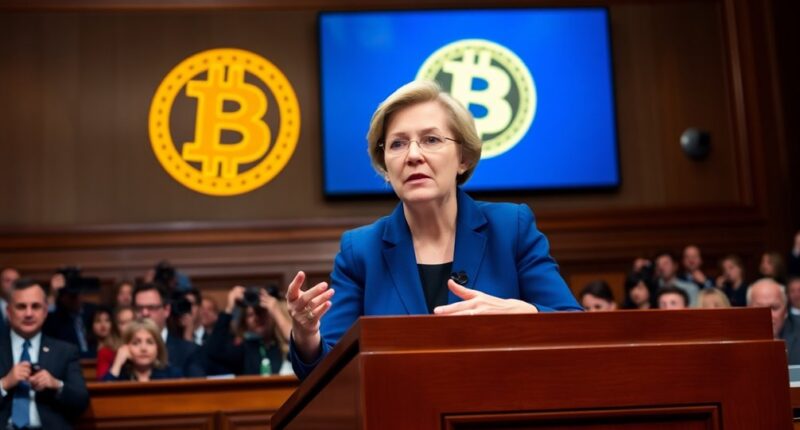Senator Elizabeth Warren's urging for stricter cryptocurrency regulations is gaining traction. She's pushing for measures that enhance oversight, like extending the Bank Secrecy Act and implementing Know-Your-Customer protocols. These steps aim to combat issues like money laundering and ensure accountability within the crypto ecosystem. The recent surge in Bitcoin's value has amplified the call for clearer regulatory frameworks. With bipartisan support for potential legislation, the landscape for digital currencies is evolving. If you're curious about how these developments could impact the crypto market, there's much more unfolding in this dynamic space.
Key Takeaways
- Senator Warren is advocating for the introduction of stricter regulations on digital currencies to enhance financial accountability.
- Her proposal includes extending the Bank Secrecy Act to improve reporting on digital currency transactions.
- Warren emphasizes implementing Know-Your-Customer protocols to strengthen customer verification processes.
- The Digital Asset Anti-Money Laundering Act aims to address issues related to money laundering and terrorist funding.
- Bipartisan support for Warren's proposals highlights a growing consensus on the need for regulation in the cryptocurrency ecosystem.
Warren's Call for Regulation
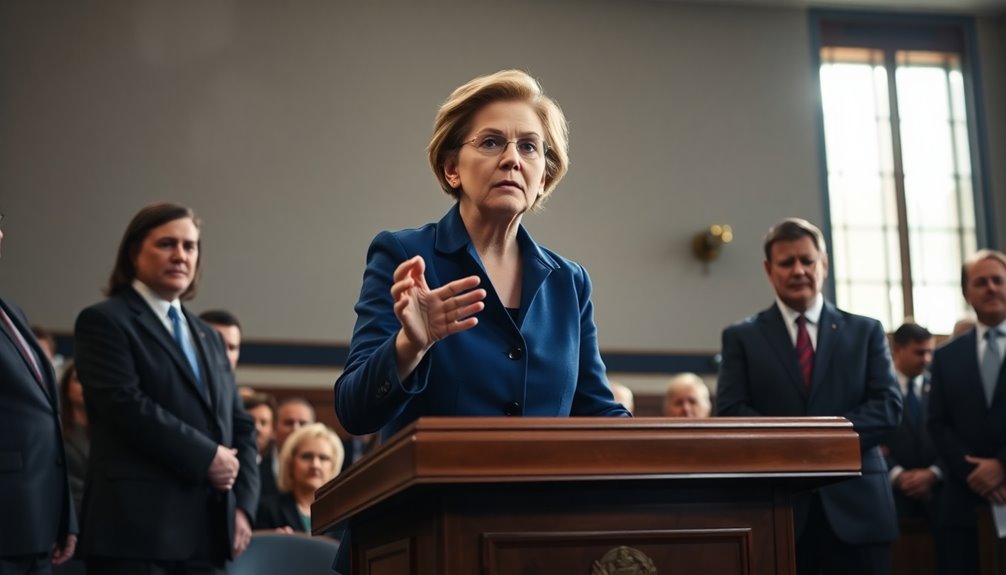
As digital currencies become increasingly prevalent, Senator Elizabeth Warren is pushing for stricter regulations to address the growing risks associated with their use. She emphasizes the need for an extension of the Bank Secrecy Act to enhance reporting requirements for digital currencies. By mandating Know-Your-Customer protocols, you'll see improved customer verification processes that close existing loopholes, especially regarding unhosted wallets. Warren's proposed Digital Asset Anti-Money Laundering Act aims to combat money laundering, drug trafficking, and terrorist funding linked to cryptocurrencies. With bipartisan support, this bill seeks to establish a comprehensive framework that holds all crypto entities accountable, ensuring a safer and more compliant financial ecosystem. It's a vital step toward tackling illicit activities in this rapidly evolving market.
Regulatory Shifts in Cryptocurrency
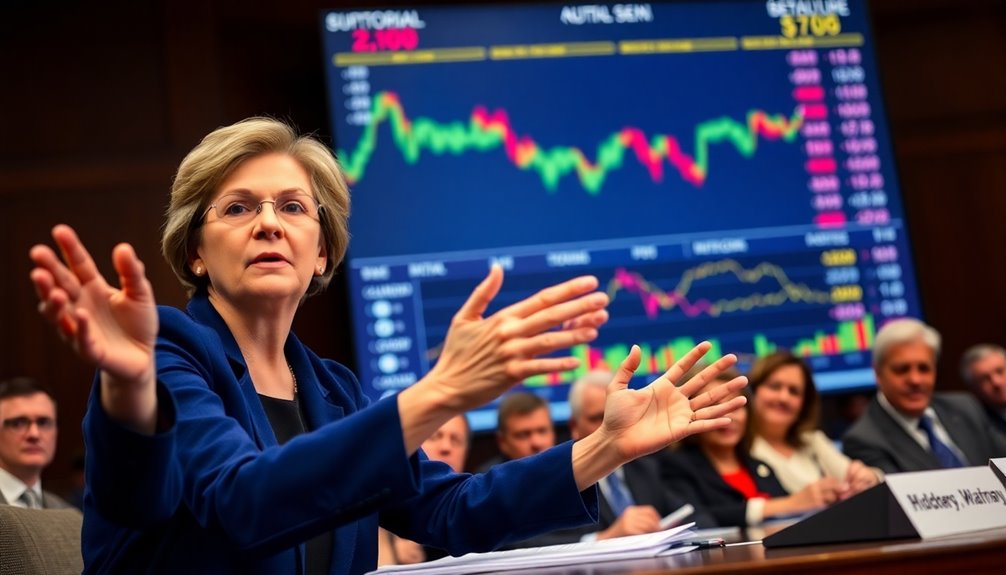
While the cryptocurrency market rapidly evolves, regulatory shifts are becoming more pronounced as lawmakers and agencies seek to address its complexities.
You'll notice that federal and state regulators are developing clearer frameworks, with states like Wyoming and Texas leading the charge. Additionally, the anticipated appointment of Paul Atkins as SEC chair may signal a shift towards a more pro-crypto regulatory environment.
Internationally, the EU's MiCA regulation sets a standard for digital asset oversight, while the OECD introduces new tax reporting requirements.
The SEC and CFTC continue to grapple with jurisdictional issues, prompting calls for legislative clarification.
As enforcement intensifies, the DOJ has formed a National Cryptocurrency Enforcement Team to combat misuse.
With these changes, compliance expectations are rising, emphasizing consumer protections and regulatory integrity as the industry adapts to these new realities.
Cryptocurrency Price Volatility
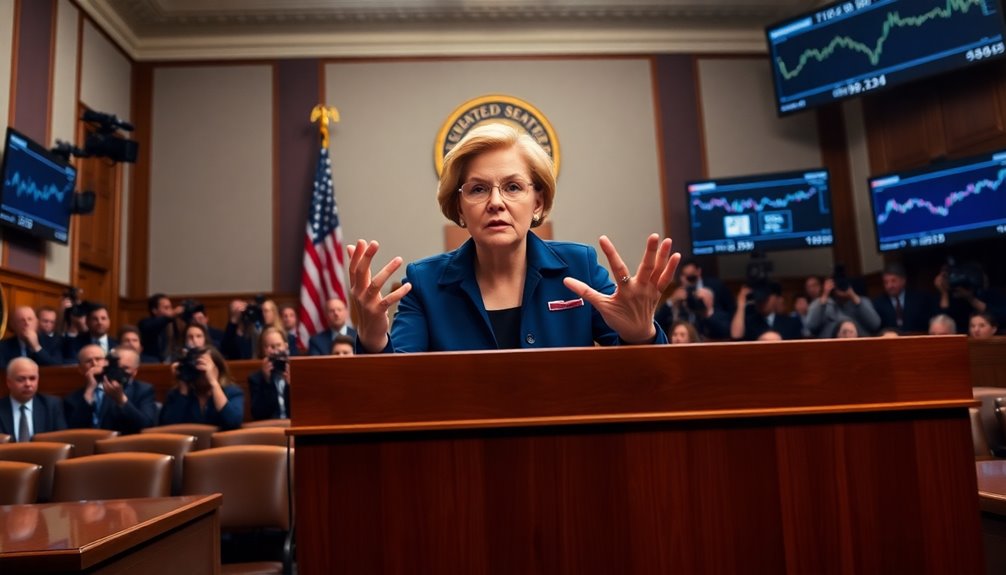
Regulatory shifts are reshaping the cryptocurrency landscape, but one of the most significant challenges investors face remains price volatility. Market sentiment plays a crucial role; positive news can drive prices up, while negative news often leads to rapid declines. This emotional trading, fueled by fear and greed, exacerbates price movements. Limited supply, like Bitcoin's cap, creates upward pressure when demand rises, but oversupply can crash prices. Additionally, large holders, or "whales," can swing the market dramatically. Crypto exhibits stronger volatility than traditional assets, contributing to the unpredictable nature of investment returns. Regulatory changes, such as announcements from the SEC, can also cause sudden shifts. Lastly, security breaches erode investor confidence and trigger sell-offs, further complicating the volatile nature of crypto investments.
Corporate Blockchain Integration
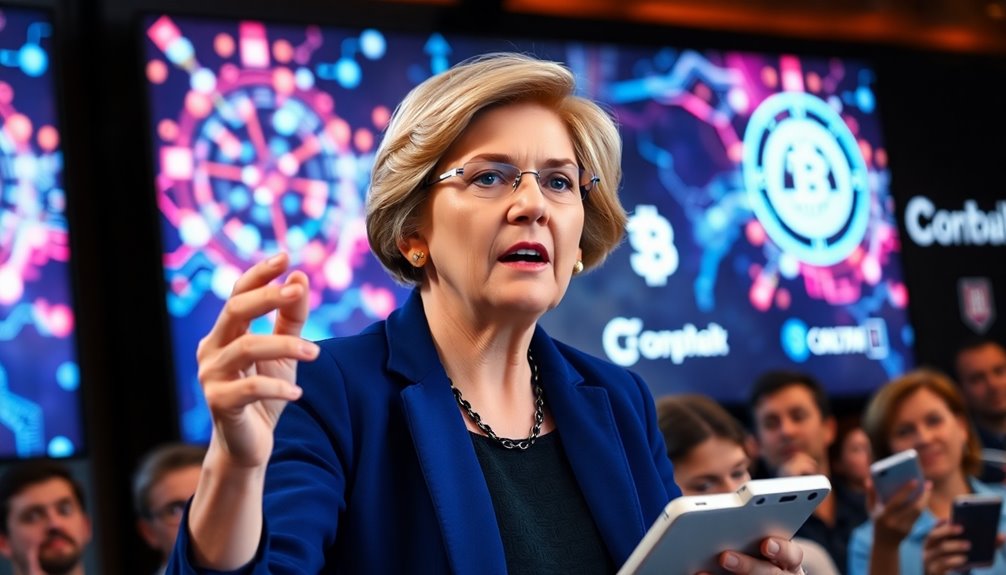
With the rise of digital currencies, many companies are exploring corporate blockchain integration to enhance their operations.
By leveraging higher data security through digital signatures and immutable records, you can ensure that access is always verified and your data remains traceable. This transparency significantly reduces disputes and speeds up reconciliation, improving your reporting accuracy. Additionally, the integration of smart contracts allows for automated processes that further streamline operations and minimize human error. Furthermore, the adoption of crypto trading strategies can be beneficial in understanding market dynamics and enhancing financial decision-making.
Moreover, automating manual tasks with smart contracts helps lower operating costs by eliminating intermediaries and reducing administrative burdens.
You'll also notice improved speed of operations, as tasks can be executed instantly, enhancing customer experience and business agility.
Election Campaigns and Cryptocurrency Policy

As digital currencies gain traction, election campaigns are increasingly navigating the complexities of cryptocurrency policy. You'll find that federal candidates can accept Bitcoin donations, thanks to FEC regulations since 2014. However, state laws vary widely, with some states imposing restrictions. California's recent reversal of its ban on crypto donations highlights this evolving landscape. Candidates like Donald Trump embrace cryptocurrency, even accepting Bitcoin for campaign contributions, while others, like Kamala Harris, remain noncommittal. Both parties are adapting their platforms to better engage with the crypto industry, but campaigns must carefully navigate the legal maze surrounding these donations. The FEC prohibits using crypto for campaign expenditures, adding another layer of complexity to campaign finance. In recent years, cryptocurrencies have been linked to various election interference tactics, raising concerns about transparency and security in political financing.
Regulatory Impact on Innovation
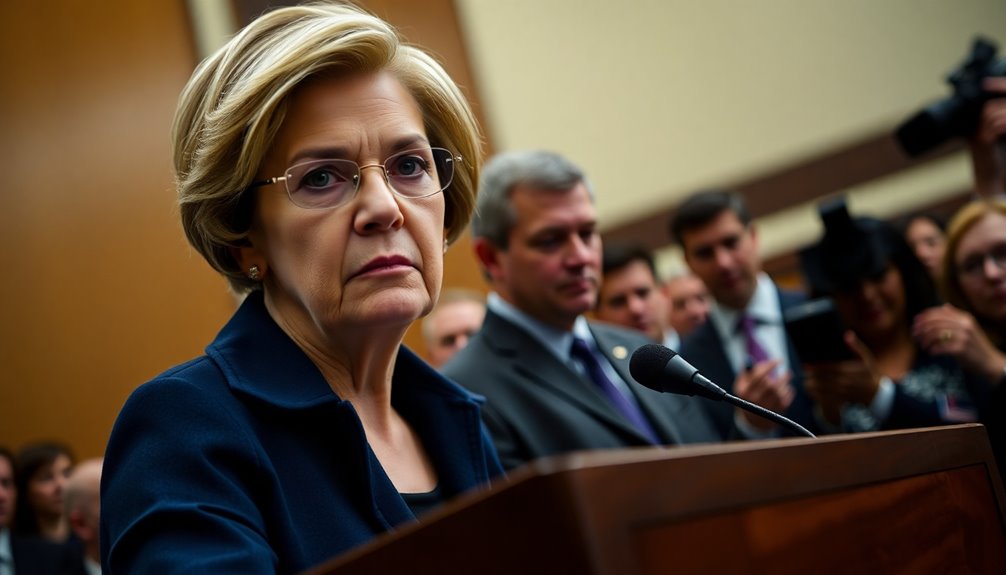
While many innovators in the cryptocurrency space seek to push boundaries, they often find that excessive regulation can stifle their creativity. Stricter rules can lead to increased compliance costs, making it hard for startups to thrive in DeFi.
You might notice that stringent regulations limit experimentation, especially for newcomers without the resources to navigate complex legal frameworks. This overregulation can even drive projects offshore, where innovation flourishes without heavy restrictions. In addition, continuous dialogue between regulators and innovators is crucial for fostering a supportive environment.
On the other hand, some regulation is necessary to ensure consumer protection and create trust in the market. Striking a balance through flexible arrangements, like regulatory sandboxes, can help foster innovation while ensuring safety and compliance.
Continuous dialogue between regulators and innovators is crucial for a supportive environment.
Frequently Asked Questions
What Specific Regulations Is Senator Warren Proposing for Cryptocurrencies?
You'll notice that some proposed regulations for cryptocurrencies focus on stricter reporting requirements, including enhanced Know-Your-Customer (KYC) protocols for all transactions.
They aim to extend anti-money laundering (AML) protections across the crypto ecosystem and implement real-time transaction monitoring systems.
Additionally, there are calls for clear guidelines on stablecoins and increased penalties for non-compliance, ensuring that all entities involved adhere to robust standards to combat illicit activities effectively.
How Do Stricter Crypto Regulations Affect Everyday Investors?
Imagine navigating a vast ocean without a map.
Stricter crypto regulations act as a guiding compass for you, the everyday investor. They enhance transparency and disclosure, helping you make informed decisions.
With better consumer protections and reduced risks of fraud, you can sail more confidently.
These regulations clarify the rules of the waters, ensuring that you understand the potential pitfalls, and ultimately, they help stabilize the turbulent crypto seas you're exploring.
What Are the Potential Risks of Unregulated Cryptocurrency Markets?
Unregulated cryptocurrency markets pose significant risks.
You face security threats from hacks and compromised private keys, which can lead to substantial financial losses. Without oversight, the chances of market manipulation and illicit activities increase, jeopardizing your investments.
Additionally, the volatility in these markets can create economic instability, making it hard to trust the value of your assets.
You need to stay informed and cautious to protect yourself in this unpredictable landscape.
How Do International Regulations Compare to U.S. Cryptocurrency Regulations?
Have you ever wondered how international cryptocurrency regulations stack up against those in the U.S.?
While the U.S. lacks a comprehensive framework, countries like the EU and Japan implement strict licensing and anti-money laundering measures.
The EU's MiCA and Japan's customer info rules offer robust consumer protections.
In contrast, the U.S. often relies on fragmented state regulations, leaving gaps that could expose investors to risks.
Clearer guidelines could foster a safer crypto environment.
What Role Do Cryptocurrencies Play in Illegal Activities?
Cryptocurrencies play a significant role in illegal activities due to their anonymity and ease of transfer.
You'll find that they're often used in darknet markets for drug trade, human trafficking, and fraud. The decentralized nature makes tracking transactions difficult for law enforcement, allowing criminals to exploit these digital currencies.
Additionally, they facilitate money laundering and sanctions evasion, raising urgent concerns about the need for stricter regulations to mitigate these risks.
Conclusion
In urging stricter cryptocurrency regulations, Senator Warren highlights the need for a balanced approach that fosters innovation while protecting consumers. With over 46 million Americans owning cryptocurrencies, the stakes are high. If the new Treasury pick embraces tighter regulations, it could stabilize the volatile market and encourage responsible growth. Navigating this evolving landscape is crucial, as the future of finance hinges on effective policy that addresses both risks and opportunities in the digital currency space. Furthermore, the implementation of these regulations could help ensure that emerging technologies within the financial sector are developed in a manner that prioritizes ethics and security. As policymakers consider their next steps, it is essential they recognize how legislative measures can effectively trump crypto executive orders that may not address the underlying challenges faced by investors and consumers alike. Ultimately, a proactive regulatory framework could pave the way for a more secure and robust digital economy, fostering public trust in cryptocurrencies.
